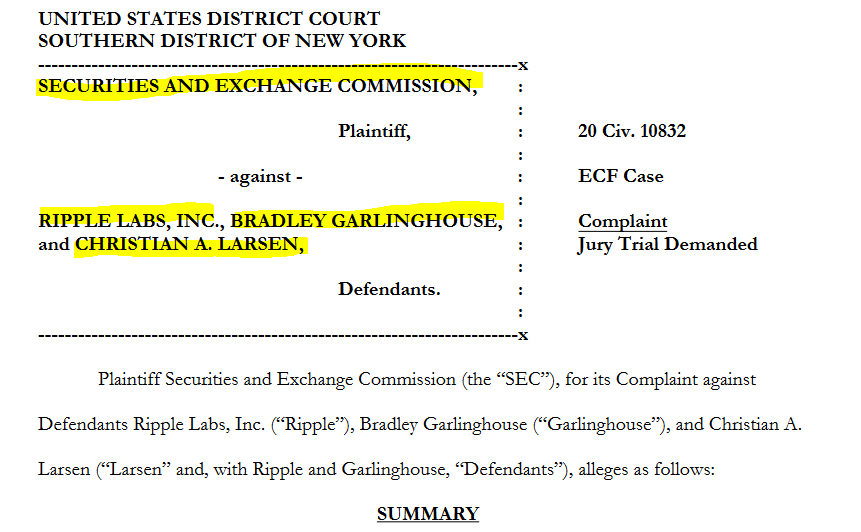2020 has seen an incredible crypto bull run with the lead crypto Bitcoin (BTC) quadrupling. After more than 10 years of Bitcoin’s existence, the time has come for institutional investors. But the last days of 2020 also saw the U.S. SEC complaint against Ripple Labs Inc. alleging that its XRP is actually a security. A regulatory attack on the entire crypto scene, some analysts argue. Once the 3rd-largest crypto, XRP’s market cap plummeted from more than $26 billion to less than $10 billion. Some crypto exchanges such as Coinbase, OKCoin, or Crypto.com have suspended trading in XRP. Is it the end of days for XRP and the crypto bull-run?
In shock after the SEC complaint, BitStamp, for example, suspended XRP trading for U.S. customers:
In light of the recent SEC filing against Ripple Labs Inc., which alleges that XRP is a security, we are going to halt all trading and deposits of XRP for our US customers on 8 January 2021 at 9 PM UTC. Our US customers will still be able to withdraw XRP from Bitstamp. Customers from other countries are not affected.
Bitstamp announcement
The market capitalization of XRP has fallen by almost $130 billion since its all-time high in 2018. The crypto project’s decline would therefore be comparable to the collapse of major financial institutions in the FIAT universe. According to Joshua Frank of crypto research firm The TIE:.
The SEC has already emphasized several times since 2017 that it sees many cryptocurrencies as securities, and therefore the relevant securities laws and regulatory provisions must be observed. This does not apply to Bitcoin (BTC) but to many other cryptos. Ripple‘s XRP and Telegram‘s Gram tokens had been qualified as security by the regulator. Telegram has withdrawn Gram threatened by the lawsuit. It agreed to return more than $1.2 billion to its investors and to pay an $18.5 million civil penalty. What Ripple is doing in light of the Dec 22-complaint is currently the subject of speculation. Anything from the bankruptcy of Ripple to a settlement with the SEC seems to be possible.
Shocked market participants
For the crypto scene, the SEC lawsuit is another slap in the face. Uncertainty among institutional investors is likely to rise again. Over the last couple of years the SEC has already rejected the approval of a crypto ETF several times, pointing out that crypto marketplaces are prone to manipulation and fraud. It is obvious that the SEC is not a friend of cryptocurrencies and is very skeptical about the developments.
The operators of the various crypto exchanges but also the providers of crypto financial products have reacted shocked to the SEC complaint. Some have discontinued or delisted XRP or at least stopped trading for US citizens. Coinbase was sued by a customer over XRP commissions Bloomberg reported. Allegedly, Coinbase knew XRP was a security rather than a commodity and “illegally” sold it. The lawsuit comes about two weeks after Coinbase filed to go public. It’s expected to be the U.S.’s first crypto-related initial public offering, a watershed moment for the industry in gaining mainstream recognition.
Unimpressed Bitcoin
The markets are always right. In this respect, the SEC lawsuit against Ripple should not be the end of the crypto bull-run. Bitcoin (BTC) presents himself fairly unimpressed and is still trying to crack the $30,000 mark.
The SEC Complaint
On 22 December 2020 the SEC announced that it has filed an action against Ripple Labs Inc. and two of its executives alleging that they raised over $1.3 billion through an unregistered, ongoing digital asset securities offering. According to the SEC’s complaint, Ripple, Christian Larsen, the company’s co-founder, and former CEO, and Bradley Garlinghouse, the company’s current CEO, raised capital to finance the company’s business. Allegedly Ripple raised funds, beginning in 2013, through the sale of XRP in unregistered security offering to investors in the U.S. and worldwide. Ripple also allegedly distributed billions of XRP in exchange for non-cash consideration, such as labor and market-making services.
The SEC‘s complaint, filed in federal district court in Manhattan, charges defendants with violating the registration provisions of the Securities Act of 1933, and seeks injunctive relief, disgorgement with prejudgment interest, and civil penalties.
